Resources
Very helpful overview, followed by more detailed and extended discussion as well as references.
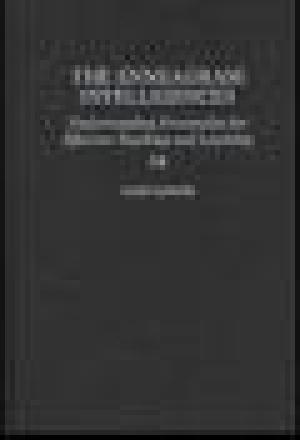
First taught in the United States in 1971, the Enneagram is now used in counseling settings, corporations, university classrooms (including Stanford Business School) and other educational institutions. The Enneagram system is a model of human development which describes nine patterns of personality. Each type is distinct with its own point of view and focus of attention based on nine psychological strategies. Janet Levine has analyzed the system and refined it for use by educators and students in the quest to facilitate teaching and learning. (From the Publisher)
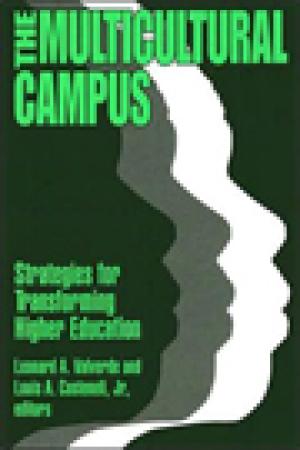
The Multicultural Campus brings together administrators, faculty, and students to offer strategies that will alter the academic environment of the future. Hispanic, African, and Asian American educational leaders examine the obstacles they have faced, as minorities, climbing up the predominantly white career ladder in American universities. Firsthand accounts show how change on governance, executive, faculty, and curricula levels will help us better educate all students in our nation's growing pluralistic society. (From the Publisher)

On one level, the world of higher education is still, as Matthews puts it, 'a chunk of the 20th century dropped live and squabbling on the threshold of the 21st.' But behind the stately trees and lovely towers a powerful hidden life has taken root, as academe is buffeted by the same economic and demographic forces that are drastically reshaping the rest of society. What's going on in there? And while we're at it, what exactly, these days, is college for? Tracking and mapping the academic year, Matthews casts a searchlight in turn on those who learn, those who teach, and those who arrange, especially the makers and managers of money and image whose methods shape higher education more strongly every year. In the process, she goes behind the scenes at every type of school: enormous state universities like Texas or Arizona, where finding French class requires a map and a bus ticket; sleek country-club schools like Vanderbilt or USC, where student allowances can exceed faculty salaries; fiercely specialized colleges like Cal Tech, where students dream in computer languages; struggling trailer-house campuses like South Dakota's Sinte Gleska, the nation's first Native American university. Throughout, Matthews keeps in unsparing focus the conflicts between our competing images of what college is supposed to be: show business, rite of passage, profit machine, private planet, gateway to knowledge and power. Irreverent, engrossing, vastly entertaining, and intensely observed, Bright College Years is one veteran journalist's (and native daughter's) inside scoop on a beloved American institution in the grip of enormous change. (From the Publisher)
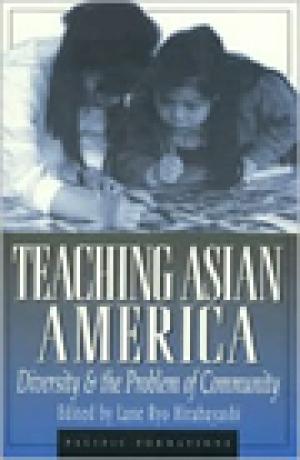
This innovative volume offers the first sustained examination of the myriad ways Asian American Studies is taught at the university level. Through this lens, this volume illuminates key debates in U.S. society about pedagogy, multiculturalism, diversity, racial and ethnic identities, and communities formed on these bases. Asian American Studies shares critical concerns with other innovative fields that query representation, positionality, voice, and authority in the classroom as well as in the larger society. Acknowledging these issues, twenty-one distinguished contributors illustrate how disciplinary and interdisciplinary approaches to Asian American Studies can be utilized to make teaching and learning about diversity more effective. "Teaching Asian America" thus offers new and exciting insights about the state of ethnic studies and about the challenges of pluralism that face us as we move into the twenty-first century. (From the Publisher)
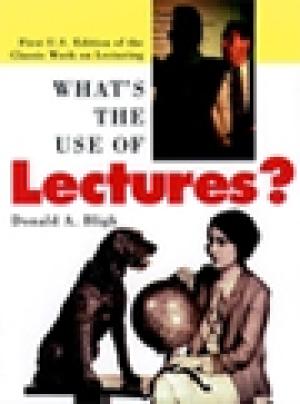
In this first American edition of a best-selling classic, Donald Bligh draws from decades of research and hands-on experience to help college and university teachers develop and use lectures effectively. What's the Use of Lectures? is an indispensable guide for anyone who aspires to be a skilled lecturer and teacher. It examines the nature of teaching and learning in a classroom lecture--describing how students learn, how much knowledge they retain, and how to enhance their attention and motivation. Bligh builds on this information to share strategies forcreating organized, thoughtful, and effective lectures. Topics include taking notes, using handouts, practicing different formats and styles, obtaining feedback, overcoming difficulties, evaluating the lecture, and testing alternative methods when lecturing is not adequate. Also included are tables and diagrams to illustrate different approaches to lecturing. (From the Publisher)
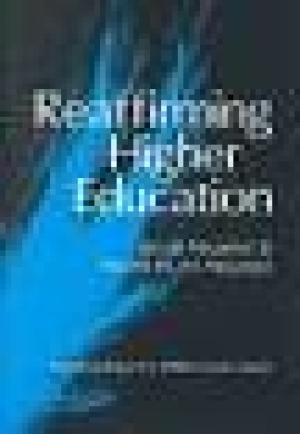
The American college and university today must assess what difference scholarship makes to teaching and what teaching means to scholarship. Reaffirming Higher Education asks who teaches, what, to whom, and why. The authors maintain that what matters in higher learning is learning, while denying that scholarship detracts from teaching. The authors outline reform and renewal for both the institutional and personal dimensions of higher learning that would encompass the ideal of the academic ethic. (From the Publisher)
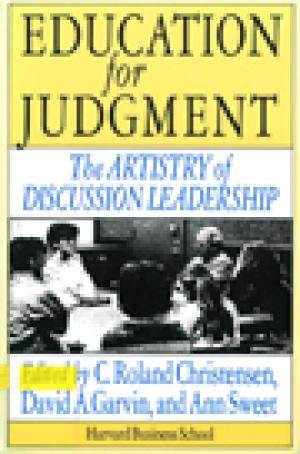
The contributors to Education for Judgement maintain that the elements of great teaching can be identified and consciously practiced. Many of the essays describe the building blocks of successful group leadership: negotiating a "contract" governing the conduct of the group; orchestrating a constructive process of questioning,listening,and responding; encouraging independent thinking; and guiding participants toward useful roles in their interaction with one another. The other chapters in the volume take a broader,more philosophical view of discussion leadership. They cover the ethical considerations of discussion teaching,the special challenges of teaching technical material using this method,and one pioneering effort ot introduce a participative mode of medical education. First-person accounts of discussion leaders' experiences provide useful insights into the joys and pitfalls of teaching by the discussion method. (From the Publisher)
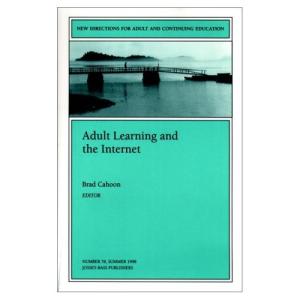
More than thirty-six million people in the United States are already using the Internet, and many more will join them in the years to come. Tools such as e-mail, Web browsers, and on-line conferencing present exciting opportunities for both adult learners and their instructors. The purpose of this volume of New Directions for Adult and Continuing Education is to explore the effects of the Internet on adult learning--both as that learning is facilitated through formal instruction and as it occurs spontaneously in the experiences of individuals and groups--and to provide guidance to adult and continuing educators searching for ways to use the Internet more effectively in their practice. Taken as a whole, the sourcebook provides a thorough survey of the research literature. The chapters also reflect the hard-won personal experiences of the authors, all of whom are directly involved in the use of Internet technologies to facilitate adult learning. This is the 78th issue of the quarterly journal New Directions for Adult and Continuing Education. (From the Publisher)
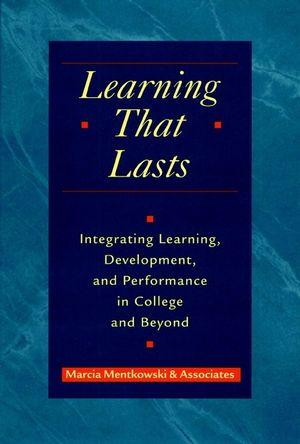
Today's colleges and universities face increasing pressure to develop programs and curricula that will teach students how to handle life's unexpected challenges and events. For educators and policymakers, this urgency will only grow as new global trends emerge and social expectations change. This timely book explores what it means for learners to transform themselves and for educators to foster essential skills for learning, leading, teamwork, and adapting with integrity in college and beyond. The authors begin by defining "learning that lasts" as the successful integration of learning, development, and performance. Drawing on two decades of longitudinal studies of student learning in the highly acclaimed curriculum at Alverno College and on leading educational theories, Marcia Mentkowski and her associates set forth a theory of deep and durable learning that includes practical strategies for enabling a wide range of students to cultivate integrative and expansive capabilities across a lifetime. They present concrete suggestions on the ways that faculty and academic staff can work together to forge effective curricula, design innovative programs, implement key institutional goals, and renegotiate the college culture. They analyze compelling research results, collaborative inquiry by consortia of institutions, and twenty-five years of experience to illuminate what educators and administrators must achieve so that increasingly varied learners can realize their goals and potential. Learning That Lasts intertwines educational theory, practice, and research by demonstrating how learning frameworks can shape curricula, teaching strategy, and assessment. It presents core curriculumprinciples for practice and it also systematically tests assumptions about student learning, development, and performance. This landmark volume provides a detailed blueprint for understanding and promoting purposeful, responsible contribution to work, personal, and civic life. (From the Publisher)